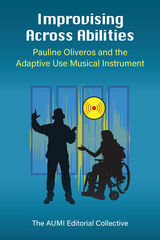7 start with M start with M
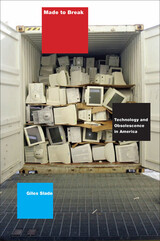
Listen to a short interview with Giles SladeHost: Chris Gondek | Producer: Heron & Crane
If you've replaced a computer lately--or a cell phone, a camera, a television--chances are, the old one still worked. And chances are even greater that the latest model won't last as long as the one it replaced. Welcome to the world of planned obsolescence--a business model, a way of life, and a uniquely American invention that this eye-opening book explores from its beginnings to its perilous implications for the very near future.
Made to Break is a history of twentieth-century technology as seen through the prism of obsolescence. America invented everything that is now disposable, Giles Slade tells us, and he explains how disposability was in fact a necessary condition for America's rejection of tradition and our acceptance of change and impermanence. His book shows us the ideas behind obsolescence at work in such American milestones as the inventions of branding, packaging, and advertising; the contest for market dominance between GM and Ford; the struggle for a national communications network, the development of electronic technologies--and with it the avalanche of electronic consumer waste that will overwhelm America's landfills and poison its water within the coming decade.
History reserves a privileged place for those societies that built things to last--forever, if possible. What place will it hold for a society addicted to consumption--a whole culture made to break? This book gives us a detailed and harrowing picture of how, by choosing to support ever-shorter product lives we may well be shortening the future of our way of life as well.
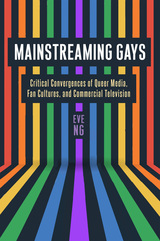
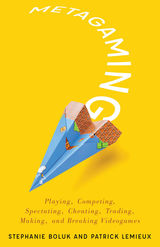
The greatest trick the videogame industry ever pulled was convincing the world that videogames were games rather than a medium for making metagames. Elegantly defined as “games about games,” metagames implicate a diverse range of practices that stray outside the boundaries and bend the rules: from technical glitches and forbidden strategies to Renaissance painting, algorithmic trading, professional sports, and the War on Terror. In Metagaming, Stephanie Boluk and Patrick LeMieux demonstrate how games always extend beyond the screen, and how modders, mappers, streamers, spectators, analysts, and artists are changing the way we play.
Metagaming uncovers these alternative histories of play by exploring the strange experiences and unexpected effects that emerge in, on, around, and through videogames. Players puzzle through the problems of perspectival rendering in Portal, perform clandestine acts of electronic espionage in EVE Online, compete and commentate in Korean StarCraft, and speedrun The Legend of Zelda in record times (with or without the use of vision). Companies like Valve attempt to capture the metagame through international e-sports and online marketplaces while the corporate history of Super Mario Bros. is undermined by the endless levels of Infinite Mario, the frustrating pranks of Asshole Mario, and even Super Mario Clouds, a ROM hack exhibited at the Whitney Museum of American Art.
One of the only books to include original software alongside each chapter, Metagaming transforms videogames from packaged products into instruments, equipment, tools, and toys for intervening in the sensory and political economies of everyday life. And although videogames conflate the creativity, criticality, and craft of play with the act of consumption, we don’t simply play videogames—we make metagames.


Elizabeth Losh has gathered experts from across disciplines—education, rhetoric, philosophy, literary studies, history, computer science, and journalism—to tease out lessons and chart a course into the future of open, online education. Instructors talk about what worked and what didn’t. Students share their experiences as participants. And scholars consider the ethics of this education. The collection goes beyond MOOCs to cover variants such as hybrid or blended courses, SPOCs (Small Personalized Online Courses), and DOCCs (Distributed Open Collaborative Course). Together, these essays provide a unique, even-handed look at the MOOC movement and will serve as a thoughtful guide to those shaping the next steps for open education.
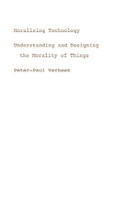
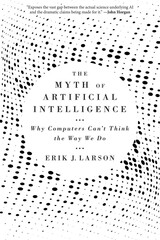
“Exposes the vast gap between the actual science underlying AI and the dramatic claims being made for it.”
—John Horgan
“If you want to know about AI, read this book…It shows how a supposedly futuristic reverence for Artificial Intelligence retards progress when it denigrates our most irreplaceable resource for any future progress: our own human intelligence.”
—Peter Thiel
Ever since Alan Turing, AI enthusiasts have equated artificial intelligence with human intelligence. A computer scientist working at the forefront of natural language processing, Erik Larson takes us on a tour of the landscape of AI to reveal why this is a profound mistake.
AI works on inductive reasoning, crunching data sets to predict outcomes. But humans don’t correlate data sets. We make conjectures, informed by context and experience. And we haven’t a clue how to program that kind of intuitive reasoning, which lies at the heart of common sense. Futurists insist AI will soon eclipse the capacities of the most gifted mind, but Larson shows how far we are from superintelligence—and what it would take to get there.
“Larson worries that we’re making two mistakes at once, defining human intelligence down while overestimating what AI is likely to achieve…Another concern is learned passivity: our tendency to assume that AI will solve problems and our failure, as a result, to cultivate human ingenuity.”
—David A. Shaywitz, Wall Street Journal
“A convincing case that artificial general intelligence—machine-based intelligence that matches our own—is beyond the capacity of algorithmic machine learning because there is a mismatch between how humans and machines know what they know.”
—Sue Halpern, New York Review of Books
READERS
Browse our collection.
PUBLISHERS
See BiblioVault's publisher services.
STUDENT SERVICES
Files for college accessibility offices.
UChicago Accessibility Resources
home | accessibility | search | about | contact us
BiblioVault ® 2001 - 2024
The University of Chicago Press






